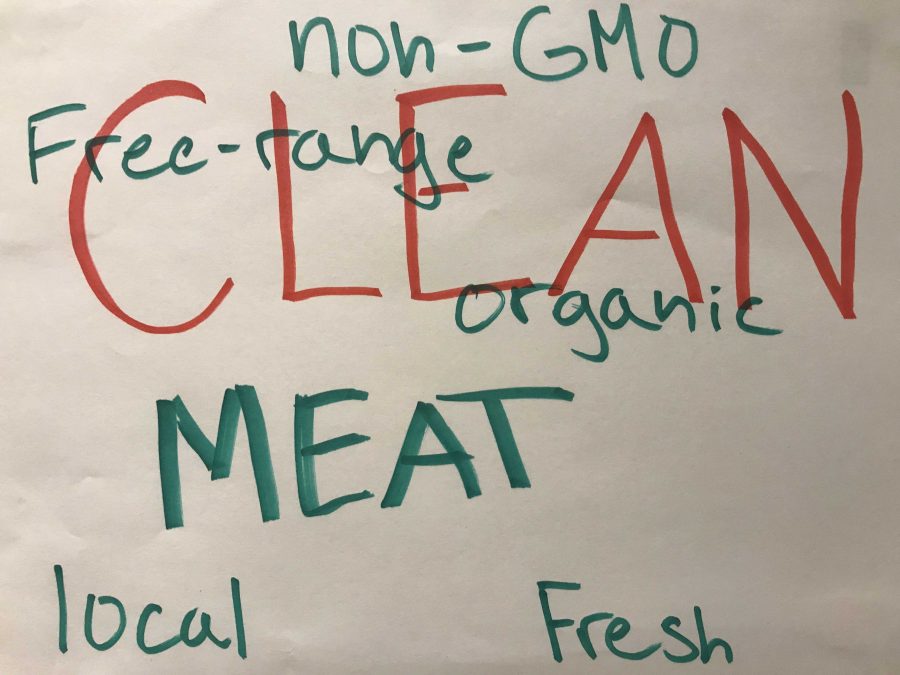Keeping it Clean
Jan 27, 2019
No matter if you eat meat or not and no matter what your reasons this solution could drastically benefit your health and the environment.
Tam and Marin as a whole is a healthy and moral conscious population. A substantial amount of students are vegetarians or vegans. Furthermore, while many Marin residents eat meat they often have moral objections to the meat industry. One would find it very difficult to walk down the meat and fish aisle of a grocery store in Marin and not find free range, grass fed, locally sourced, and organic options.
However, those who do not eat meat can sometimes find it hard to sustain a balanced diet. Around the world, 375 million people consider themselves to be vegetarian, a lifestyle choice that forces them to be on the lookout for affordable and healthy sources of protein.
Over the past few years, the scientific community has taken on the challenge of creating a suitable meat alternative. In 2013, Maastricht University’s Professor Mark Post released his first burger made of “clean meat,” meat grown in a lab from animal stem cells. Also called cultured meat, one of its primary goals is to satisfy the needs of those who oppose the meat industry, and want a more environmentally sustainable food source. Unfortunately, the process to make Post’s burger cost over $331,000.
Yet, despite its high cost, the benefits for both human and environmental health are immense. Oxford University estimates that lab-grown meat would produce up to 96 percent fewer greenhouse gas emissions than conventional meat and factory farming.[/pullquote]Oxford University estimates that lab-grown meat would produce up to 96 percent fewer greenhouse gas emissions than conventional meat and factory farming. It would also use about 99 percent less land, 45 percent less energy, and 96 percent less water. For people in Marin who are conscious about drought prevention, this could change the way they approach eating meat.

A San Francisco start-up called JUST reports that the price of clean meat per pound has more than halved since last September. However, the costs are still too high for clean meat to be commercially available to the public. With the global demand for meat continuing to rise, clean meat might be the best solution to satisfy those demands in a sustainable manner.
The process of lab-grown meat begins with taking a tissue sample from an animal. One animal can provide many tissue samples, and none are harmed in the process. From the sample, stem cells are isolated; the “master cells” of the body that serve as templates from more specialized tissues to grow. The cells are kept in conditions that mimic those inside the body of their owner, which tricks the cells into multiplying like they would in the animal. The cells are fed with proteins, salts, and a nutrient-dense serum until they grow to an acceptable-sized mass, at which point they are cooked and made into meals unrecognizable from those with conventional meat.
Unfortunately, there is a limit to the structural complexity of meat grown in a lab. A rib eye steak, for example, is not made up of only muscle cells; it contains pockets of lipids, fats, and connective tissue. The developers of clean meat are a long way off from recreating these specific matrices of cells, and will never be able to achieve the same configurations that meat-lovers are accustomed to. Currently, most available cultured meat looks more like ground beef than any of the fancier meat cuts.
Clean meat doesn’t have as much of a personal impact on vegetarians who choose not to eat meat based on preference rather than moral objections. In general, it seems many Tam students originally become vegetarian or vegan to protest the industry, and eventually grow to dislike the taste, or even the idea, of meat.
Senior Allison Burns, like most of Tam’s population, have heard little to nothing about lab-grown meat. The more well-known accepted vegetarian meat alternatives are plant-based.
“I’ve tried the impossible burger, but I just don’t like it—it tastes like a hamburger,” Burns said.
Tam senior Caroline Herdman agrees with Burns.
“At first I was a vegetarian because I thought the meat industry was really messed up, and I wasn’t in support of it,” Herdman said. “Then I became vegan for a year, and through being vegan I decided that I just didn’t really like eating animal products or, like, taking anything from animals that wasn’t necessary.”
Burns has been a vegetarian for five years, and a vegan for the last few months.
“I don’t really like the taste of meat that much, but I do love like dairy and stuff like that, so that part is more for the environment and the animals,” Burns said. “Especially the environment, because animal products cause a lot of environmental harm.”
Sophomore Danny Jenkins became a vegetarian in September of 2017 but began eating meat again these past few months.
“I ethically don’t agree with eating meat that has been caged their whole life,” Jenkins said. “Yeah, I’m not a vegetarian [anymore], but I still believe in the same things…I just had to switch, because I wasn’t eating right and I wasn’t getting enough protein.”
For vegetarians who find it difficult to maintain a balanced diet, clean meat could be the ideal solution: identical to conventional meat on the cellular level, and cruelty-free.
“I would love to try the lab meat,” Jenkins said. “I think that it is a good thing. It’s definitely a step up from eating animals, so I’m all for it.”
Tam students might only now be discovering the existence of clean meat, but for the rest of the world, the subject has already been in the spotlight for quite some time.
“Mostly when adults find out that I’m vegetarian they ask me how it’s like,” Jenkins said, “And then most ask about the lab-grown meat if it’s okay for a vegetarian to eat.”
News organizations such as WIRED, Buzzfeed and BBC News have all covered the topic of cultured meat at some point over the last two years. In December, the Wall Street Journal traveled around the world to visit a clean meat startup in Tel Aviv, Israel. Since it’s been in the public eye for a number of years now, many individual startups and businesses have emerged with their own hopes for what lab-grown meat can accomplish, or improve.
For meat-lovers, clean meat has many potential benefits, beyond being environmentally sustainable and cruelty-free. As the human population skyrockets and meat demands increase, the quality standards for the meat on the market have been dropping. Most chickens are pumped full of antibiotics to be kept alive in disease-ridden environments, and fish are contaminated by pollutants that humans are dumping into the ocean. Clean meat is, as the name implies, clean; a lab-grown fish croquette is guaranteed to be free of plastic and mercury.
Unfortunately, cultured meat has many potential obstacles, especially concerning its reception by the public. Developers are worried that a subtle difference in taste between clean meat and normal meat will turn people off of eating it. The psychological phenomenon referred to as the Uncanny Valley Effect describes the unease people feel when presented with humanoid robots that appear very close to human but are a little off.
With clean meat, this same phenomenon suggests that sophisticated imitations of meat, even if they taste or look slightly different, will freak people out. The human brain is distrustful of unidentifiable foods, in order to prevent us from ingesting anything poisonous or dangerous. Considering how familiar most people are with the characteristics of meat, this could be difficult to pull off.
Tam’s vegetarians seem, overall, to be on board with the idea.
“I am in support of it,” Herdman said, “Because I think that it’s sort of naive to say that people should never ever eat meat. Humans actually want to eat meat, and it has a lot of vitamins and minerals that are necessary to human growth and development… if it’s not harming animals, I don’t see why it’s immoral at all.”
Startups in San Francisco and around the world have plans to roll out more lab-grown meat products over the next few years, at increasingly affordable prices. Whether or not some people can overcome the “ick” factor, cultured meat will soon enter the mainstream.
“I think we don’t need to like 100 percent convert all our meat to that [clean meat],” Burns said, “But I think if it reduces our consumption of meat, it harms less animals, and it takes up less land, water, all these other things—I think it’s great.”




